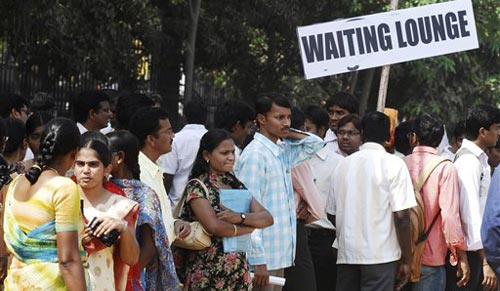
New Delhi, Jun 21: Between 2009-10 and 2011-12, the proportion of people working slipped slightly in India, and the share of unemployed persons ticked up, a government report released on Thursday has revealed. In 2009-10, 36.5% of the population was gainfully employed for the better part of the year. By 2011-12, the proportion of such workers had dipped to 35.4%. Meanwhile the unemployment rate went up from 2.5% to 2.7%.
These findings form the crux of a survey on employment and unemployment carried out by the National Sample Survey Organisation (NSSO). The survey covered over one lakh households and was carried out between July 2011 and June 2012.
The pan-India figures hide a deepening chasm between job opportunities for men and women. While the share of employed men remained roughly constant between 2009 and 2012, women's employment dropped from 18% to 16%.
This may appear a small decline, but when translated into real numbers, the crisis in employment is stark. In rural areas, about 90 lakh women lost their jobs in the two-year period. This would have been catastrophic but for the fact that in urban areas about 35 lakh women were added to the workforce.
Men joined the workforce in both urban and rural areas, though they got many more opportunities in towns and cities than in rural areas. Men's participation in the workforce jumped from 99 million to 108 million in urban areas and from 228 million to 231 million in rural areas.
Kerala had the highest unemployment rate of close to 10% among larger states. West Bengal (4.5%) and Assam (4.3%) were other large states with relatively high unemployment rates. Among the smaller states, Nagaland had a staggering jobless rate of 27%, but this may be compromised data as surveys are difficult in strife-torn areas. Tripura, another north-eastern state, but relatively more peaceful, too had a high unemployment rate of over 15%.
The NSSO report also contains striking information on daily wage rates of casual labourers and regular or salaried employees. Wages given to casual labourers in the government's job guarantee program (MGNREGS) were lower than similar work elsewhere and more than a third lower than other types of casual work. In the job guarantee scheme, male workers were getting an average of Rs 112.46 per day, while in non-MGNREGS public works the rate was Rs 127.39. In non-public works wages stood at Rs 149.32. For women, the average was more similar at about Rs 102-110, though lower than men for the same work. This appears to go against a widely held belief that MGNREGS wage rates are setting the standard for all other wages in rural areas.
The wide difference in wage rates in urban and rural areas explains why people are migrating from their homes to live in cities to earn a living. A male casual laborer earned about Rs 150 per day in rural areas, but his urban counterpart got Rs 180 a day. Similarly, a salaried employee could earn about Rs 300 per day in rural areas but in urban areas the daily earning would shoot up to nearly Rs 450.





Comments
Add new comment